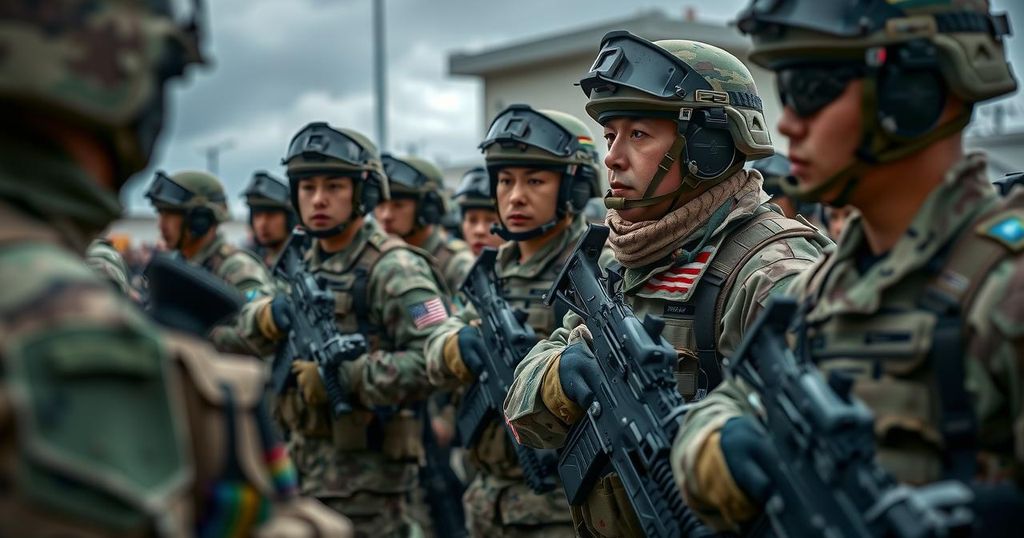World news
ASIA, BIDEN ADMINISTRATION, CHINA, DEFENCE, DEFENSE MINISTRY, ENERGY INFRASTRUCTURE, EUROPE, EUROPE/ASIA, GEOPOLITICS, INDO - PACIFIC, KIM, KIM JONG UN, KURSK, KYIV, MEXICO, MILITARY, NORTH AMERICA, NORTH KOREA, RUSSIA, SETH GODIN, SOUTH KOREA, UKRAINE, US, VLADIMIR PUTIN, VOA, WAR, WORDPRESS
Lena Nguyen
0 Comments
North Korea May Deploy Thousands of Troops to Russia Amid Ukraine Conflict
North Korea is contemplating sending up to 100,000 troops to support Russia in its conflict with Ukraine, a move that may not happen immediately. Current estimates suggest approximately 15,000 troops could be deployed to the Kursk region and rotate periodically. This military partnership alarmingly extends the conflict’s global ramifications, influencing security dynamics in the Indo-Pacific and drawing international concern.
Recent analysis indicates that North Korea may send up to 100,000 troops to support Russia in its ongoing conflict with Ukraine. This partnership between North Korean leader Kim Jong Un and Russian President Vladimir Putin has drawn the attention of international observers. However, it should be noted that the deployment of such a large military contingent is not expected to occur immediately; should it happen, troops would likely be sent in phases rather than all at once. Ukrainian officials have suggested that as many as 15,000 North Korean troops could be deployed in the Kursk region, rotating periodically to bolster Russian military efforts. This evolving military cooperation is raising concerns among Ukraine’s allies about further escalation of the conflict, which is already the largest in Europe since World War II. As the partnerships deepens, implications extend beyond Ukraine and Russia, potentially affecting the security dynamics in the Indo-Pacific region amid intensified rivalries between China and the United States. Chancellor Olaf Scholz of Germany plans to address this situation with Chinese President Xi Jinping, urging him to influence both Russia and North Korea to avoid further conflict escalation. Notably, Xi has remained publicly silent on the troop deployment, raising questions about China’s stance and its presented image of seeking stability on the Korean Peninsula. Reports have surfaced indicating that North Korea has already dispatched over 10,000 troops to assist Russian operations and may seek advanced military technology from Russia in return. This includes capabilities related to tactical nuclear weapons and intercontinental ballistic missile systems. Moreover, North Korea is supplying significant quantities of munitions and weaponry to Russia. Ukraine continues to advocate for support from its allies, seeking long-range Western weapons to counter Russian strikes more effectively.
The discussions surrounding North Korea’s potential military assistance to Russia signify a significant development in the ongoing conflict stemming from Russia’s invasion of Ukraine. The alliance between Moscow and Pyongyang suggests a broader geopolitical shift, with Kim Jong Un offering military support to bolster Putin’s initiatives, potentially altering the military landscape in the region. This partnership is particularly relevant given the strategic implications for global powers, especially in the context of rising tensions between China and the US. Previously, Ukraine’s representatives and allied officials have voiced concerns about how this cooperative military effort could influence the existing balance of power internationally, especially considering the historical context of conflicts involving North Korea. Furthermore, it highlights the interconnectedness of contemporary conflicts, where military support can redefine the parameters and intensity of warfare.
In summary, North Korea’s potential deployment of troops to support Russia raises significant alarm regarding the future of the conflict in Ukraine and its geopolitical ramifications. As both nations deepen their alliance, the involvement of international powers such as China remains crucial, with implications on the security balance in the Indo-Pacific region. As Ukraine seeks additional military support against Moscow’s advances, the global community must carefully monitor these developments to address the emerging threats effectively.
Original Source: m.economictimes.com




Post Comment